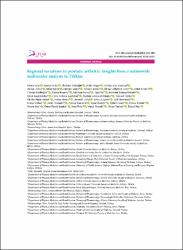Regional variations in psoriatic arthritis: Insights from a nationwide multicenter analysis in Türkiye

View/
Access
info:eu-repo/semantics/openAccessDate
2024Author
Kılıç, ErkanKılıç, Gamze
Tekeoğlu, İbrahim
Sargın, Betül
Kasman, Sevtap Acer
Alkan, Hakan
Şahin, Nilay
Cengiz, Gizem
Metadata
Show full item recordAbstract
Objectives: The study aimed to investigate and compare clinical features, disease activity, and the overall disease burden among psoriatic arthritis (PsA) patients across seven distinct geographic regions in Türkiye. Patients and methods: A multicenter cross-sectional study involving 1,134 PsA patients from 25 referral centers across seven regions was conducted. Demographic and clinical characteristics, comorbidities, joint involvement, extra-articular manifestations, and disease activity measures were evaluated across regions. Results: A total of 1134 PsA patients from seven different geographic regions in Türkiye participated in this study. The highest number of participants was from the Marmara region (n=409), with subsequent representation from Central Anatolia (n=370), Aegean (n=139), Mediterranean (n=60), Black Sea (n=60), Eastern Anatolia (n=60), and Southeastern Anatolia (n=36) regions. There were significant variations in demographic profile, including age, body mass index, age of disease onset, educational status, comorbidities, and family history of both psoriasis and PsA. Clinical features, such as enthesitis, dactylitis, uveitis, and joint involvement, demonstrated significant variation across regions. Additionally, disease activity measures, including pain, patient and physician global assessments, acute phase reactants, disease activity indices, quality of life, and functional status, displayed considerable regional differences. Conclusion: This nationwide study revealed substantial regional diversity in demographic data, clinical characteristics, disease activity, and quality of life among PsA patients in Türkiye. These findings stress the need to customize treatment approaches to address regional needs and to conduct further research to uncover reasons for disparities. It is crucial to enhance region-specific approaches to improve patient care and outcomes for PsA.

















